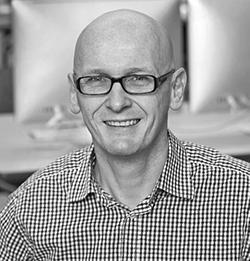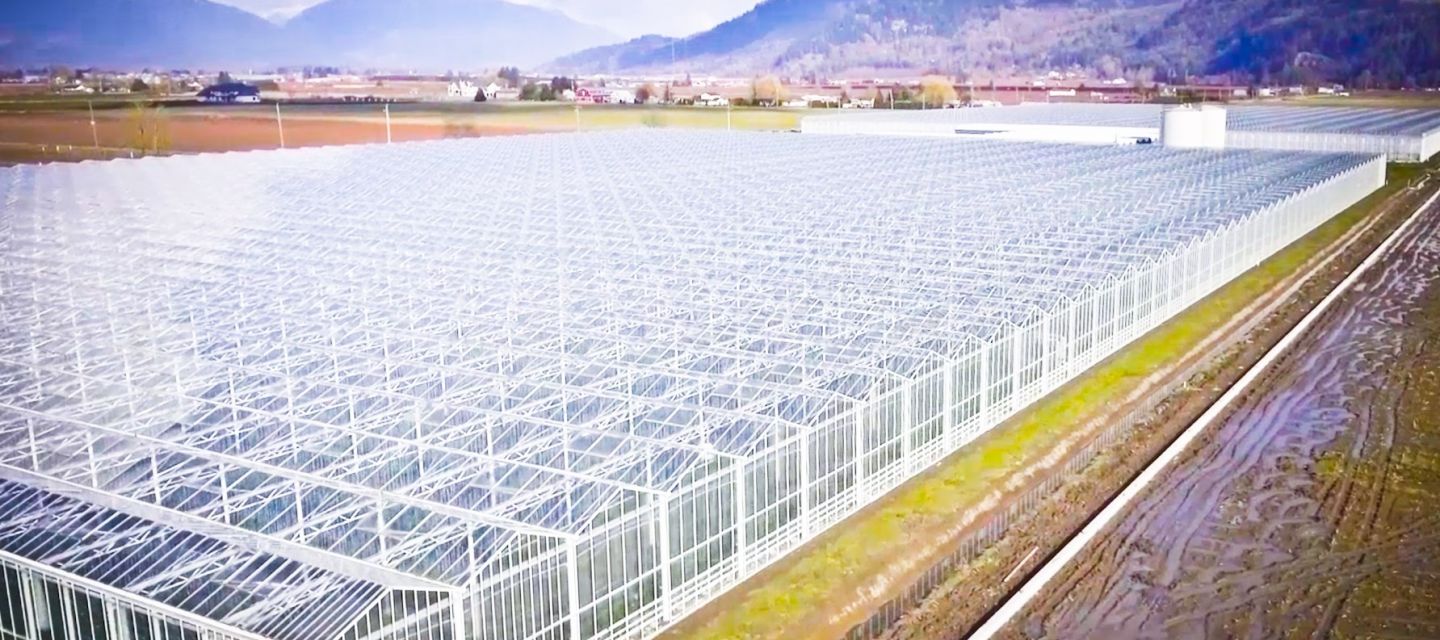Disruptive tech start-ups create global gains financially and socially with help from the Creative Destruction Lab.
An autonomous robot developed by Ecoation works to detect plant stress inside this tomato greenhouse in Chilliwack, BC. It’s one example of an idea developed with support from UBC Sauder’s Creative Destruction Lab (CDL)-West program, which includes mentorship from the likes of Jeff Mallet, former COO of Yahoo and Colin Harris, founder of PMC Sierra.
Story by Sue Bogos
This summer in the wake of political responses to highly charged social situations, high-profile CEO-whisperer Alan Fleischmann told the New York Times: “For a long time, corporate social responsibility was a buzzword marketing tool, walled off within an organization. Now it has to be central for the CEO, part of their everyday responsibility and leadership.”
So how does a sentiment like that play out in the fast paced and highly competitive world of early stage tech start-ups? For Saber Miresmailli, founder and CEO of Ecoation Innovative Solutions, social responsiblity is an inherent part of daily business as he takes action to change the world through a growing venture like Ecoation. He does so with support from the UBC Sauder-based Creative Destruction Lab (CDL), where he and other entrepreneurs formed the first cohort to go through CDL-West.
Miresmailli developed a technology that uses artificial intelligence to identify plant stress in greenhouses much earlier than ever before, enabling growers to literally deal with the root cause of a problem before it grows. This leads to reduced use of pesticides, greater crop yields and ultimately cleaner, more abundant and more accessible food for consumers. “We are essentially creating a ‘centre for disease control’ for plants,” he explains, and gratefully attributes the idea for that analogy to one of his CDL mentors.
A new way of pushing tech start-ups to thrive
The Creative Destruction Lab (CDL) is an early-stage, milestone-based, seed investment program for massively scalable disruptive technologies. It was founded five years ago by University of Toronto Rotman professor Ajay Agrawal, who completed his PhD at UBC Sauder in the mid ‘90s. In Vancouver, UBC Sauder professor Paul Cubbon leads the CDL-West program.
“I was hooked,” says Cubbon. “I told him I believed in the mission and that I wanted to partner with him.”
With an industry background and extensive experience as an entrepreneurship professor at UBC Sauder, Cubbon is keen to see the rapid creation of more high impact companies. He was impressed by Agrawal’s program so he brought the right people together to secure a formal five year partnership between the universities and start CDL-West. He also worked diligently to bring the right people on board as founders and, most importantly, mentors to the start-ups. Mentors include the former COO of Yahoo and the founder of PMC Sierra.
The nine-month program is made up of five one-day sessions, with eight weeks between sessions. During these sessions, mentors assess progress and help define three clear objectives to be achieved by the next session. “We began this cohort with 25 start-ups and right now there are 13 left. It is a cutting program that focuses resources on the ventures that are making the most progress. It does not mean the other ventures won’t succeed, but the CDL focus is on those moving the fastest with CDL help,” explains Cubbon.
I asked Ajay why he was doing this (CDL) given that he is a busy researcher and educator, and he told me ‘It’s about the future of a post natural-resource Canadian economy and society.’ I was hooked, and I told him I believed in the mission and that I wanted to partner with him. – Paul Cubbon

Profits and public interest can coexist
He doesn’t hesitate to emphasize that CDL actually embodies the idea of responsible leadership itself. The highly successful mentors (known as the G7), volunteer about 10 days per year sharing their wisdom and experience to help the ventures move forward. “There are other ways these people could invest in tech start-ups without putting all this time to help young scientists with exciting tech take unreasonable bets on helping society, but they choose to do this. And university science is typically that—attempts to better humankind, human health and the natural environment. This all seems like responsible leadership epitomized,” he adds. It is responsible leadership that also aims to inject an incredible boost to the Canadian economy. CDL has an ambitious target of achieving $100 billion in equity value by 2027, with CDL-West planning to generate $20 billion of that sum. They are already well on their way.
CDL exists to take science out of the laboratories and into business to positively impact the human condition. Most of the accepted ventures exist to leave a lasting legacy for the world and provide positive social impact. – Darrell Kopke
Miresmailli also touts the importance of inherent responsible leadership in tech start-ups. “I think each leader needs to define that term in the context of their own sphere of influence; in my case, we are talking about food safety and security,” he explains. “My team realizes we can have a global impact in democratizing food quality for all. My role in shepherding that through our company and supporting global organizations that share our vision is key to making that happen. The fact that CDL exists and these people are demonstrating how to do good in the world is really important for fostering responsible entrepreneurs of the future.”
UBC Sauder entrepreneurship training is applied and makes an impact
With that focus on the future in mind, student involvement is a key asset of CDL. “One of the core raisons d’être of CDL is to enhance entrepreneurship pedagogy by integrating students into live start-up ventures. Students can see the results of their work in a real start-up, so learning is experiential and impactful,” says Darrell Kopke (MBA ‘01), an entrepreneurial business leader (and original member of the lululemon executive team) who was hired by Cubbon for the CDL-West leadership team. He teaches related undergraduate and MBA level courses at UBC Sauder and also serves as COO for CDL in Toronto.
My father had incredible moral fibre and integrity in all of his business dealings, and heart and compassion is entirely my mother. The Creative Destruction Lab has those qualities inherent within it. I like that our family’s name can be connected with that. It speaks well of our future leaders. – Leigh Sauder
One of those students is Paras Sharma, a former neuroscientist and consultant who is currently completing his MBA at UBC Sauder. He successfully obtained a coveted summer internship with CDL, “This is a very challenging opportunity, and I love it!” he says. He manages nine of the start-ups and works specifically on business issues with three ventures.
“For Ecoation, I completed research to identify resources and market opportunities to support one of their objectives,” says Sharma. “It was actually unnerving to realize that with a disruptive technology there is no safety net; you have to figure things out and become the expert yourself. I have learned so much and have also found the opportunity to observe the CDL sessions with the mentors to be incredible.” In turn, Miresmailli says his company benefitted from how Sharma became invested in their vision and how he went the extra mile to contribute.
Creating economic and social value with integrity and humble ambition
Leigh Sauder, an entrepreneur and daughter of the school’s namesake Bill Sauder, is very selective about the organizations with which she associates, ensuring their values match her passion for social impact and providing solid social value within their operations. So she wasn’t quite sure what to expect when invited to her first CDL experience. She says, “I was pleasantly surprised by the social impact opportunities created and encouraged by CDL. The idea of creating employment, of these superstar entrepreneurs who are committed to paying it forward through volunteering their time and expertise, and the inherent value of the social impact in several of the tech ventures themselves really interested me,” she says.
As a CDL-West founder who has supported the program financially, Sauder was impressed that one session attended by both mentors and the start-ups focused on the topic of humility. “I was really struck by the deliberate inclusion of that in the program and the discussion it generated. Everyone there really seemed to take it to heart, and the mentors themselves are great examples of people who have a lot of reasons to have big egos but don’t.”
Sharma adds, “The collegial network of expertise in the room is staggering. CDL is an amazing blend of altruistic philanthropy and business mentorship, which always seems to be directed toward thinking about how the end customer will benefit from that venture.”
Just to be in the same room with the mentors and their collective wisdom is incredible—I call them the humble millionaires. They are sitting in front of you in their t-shirts and jeans talking about business and having been where you are; it gives you a feeling of ‘I can do it!’ Canada really is the best place on earth for entrepreneurs right now - Saber Miresmailli.
Sauder says that a speaker at a recent UBC Sauder commencement address pointed to the importance of creating business leaders with integrity, heart and compassion. “My father had an incredible moral fibre and integrity in all of his business dealings, and the heart and compassion that speaker discussed is entirely my mother. I think that CDL, while it is a strongly business-focused program demonstrating incredible economic potential, has those qualities inherent within it. And I like that our family’s name can be connected with that. It speaks well of our future leaders,” she says thoughtfully.
Through a proven method of taking high-potential start-ups and supporting them to accelerate development towards high growth companies, with the view of making the world a better place, CDL-West is demonstrating its worth in more ways than one.
